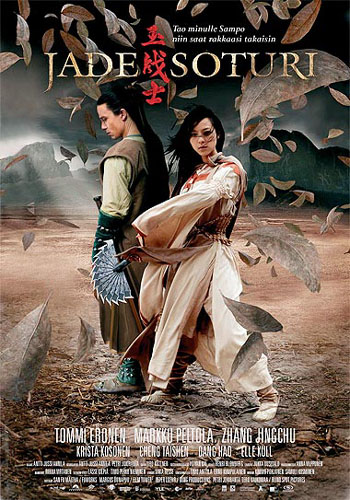| Home / Entertainment / News | Tools: Save | Print | E-mail | Most Read |
| Jade Warrior Brings Finnish Epic to China |
| Adjust font size: |
Finnish cinema may be remote for many Chinese moviegoers accustomed to Hollywood blockbusters. Jade Warrior, the first Sino-Finnish co-production, will give Chinese audiences some ideas about Finland's film and culture. The movie had its world premiere at the Toronto International Film Festival in September, and public screening began in China last week. "I don't think it's a straightforward action film though Chinese martial arts is applied to many fight scenes," says director Antti-Jussi Annila, who says it took him seven years just to prepare for the shooting itself. The story line is inspired by the tragic Finnish epic, The Kalevala, and revolves around a love-struck hero who fights against the restrictions of modern life and searches for a love that transcends time and place. On his journey to be reunited with his lover, he discovers his true origin, his skills as a warrior and his unique destiny. "Actually Chinese people don't need to know much about Nordic mythology," says director Annila. "The feelings of the hero transcend traditional cultural and geographical boundaries. I would call it a love story or a fantasy film." Jade Warrior is Annila's feature debut. With a moderate budget of 30 million yuan (US$3.75 million), it uses various shooting venues from Finland and Estonia to the Hengdian TV and film shooting location in China's Zhejiang Province. Finnish actor Tommi Eronen and Chinese actress Zhang Jingchu play the lead roles. The eye-catching cast also helped the movie top the weekend Finnish box office after its opened several weeks ago. Zhang plays the doomed lover of the hero - the jade ornament she wears is a mysterious proof for their relationship. Hailed for a similar kung fu image in ancient costume drama, Zhang is frequently compared with another Chinese actress Zhang Ziyi who established her fame in Ang Lee's Crouching Tiger, Hidden Dragon. "Zhang Jingchu is one of the best actresses I have ever seen," director Annila says. "She gave her best during the filming. Though I haven't met Zhang Ziyi, I believe she is also talented." Zhang Jingchu, however, missed the Shanghai premiere this week, as she reportedly is preparing for a Hollywood production, Rush Hour III. Compared with the United States and China, Finland doesn't have a strong, vibrant film industry. The country with only five million people produces just 10 to 15 movies a year, many of them art-house films. In recent years, Chinese cinema has become increasingly popular in Finland. Finland people know such Chinese filmmakers as Wong Kar-wai and Zhang Yimou, and a personal film exhibition of Wong's works is being staged in theaters in Helsinki. According to Professor Gu Xiaoming of Fudan University, Finnish films, like many other Nordic cinemas, have slow rhythms, detailed portrayals of nature, and a gloomy mystic flavor. "Unlike Hollywood blockbusters, Finnish films don't impress audiences with stunning visual effects or complex story lines," Professor Gu says. "They usually center on sensitive human relationships and the delicacy of an individual's feelings." You may feel that Finnish movies are not as refined as other European productions such as Italian and French pictures. But they offer distinctively honest, wild and simple elements, which also remind people of Nordic cuisine, furnishings and their soccer teams. And because of the special climate, geography and irregular sunlight, people in Finland have closer and more sensitive relationship with nature. Prophesy, illusion and the mythical power of nature are portrayed in Finnish cinema. For many local moviegoers, however, it still takes time to learn to appreciate the beauty and charm of Finnish cinema. "I find it hard to touch the real meaning of this movie," says movie buff Kevin Fan. "Finland and China have quite different cultural origins. Nevertheless, it is a good sign that we still have many alternatives besides Hollywood movies." (Shanghai Daily November 6, 2006)
|
| Tools: Save | Print | E-mail | Most Read |
 |
| Related Stories |
|
